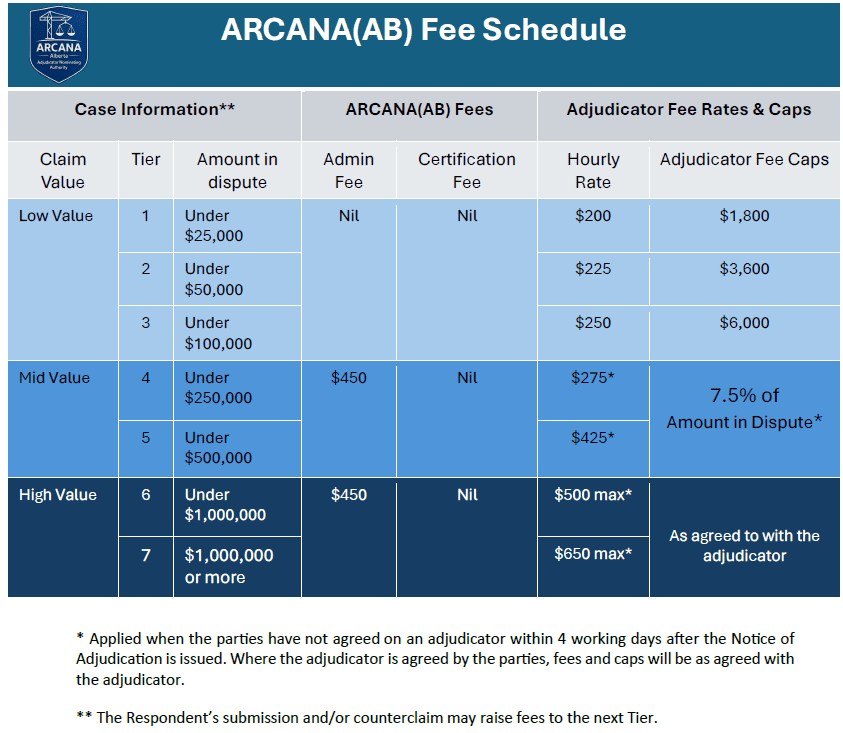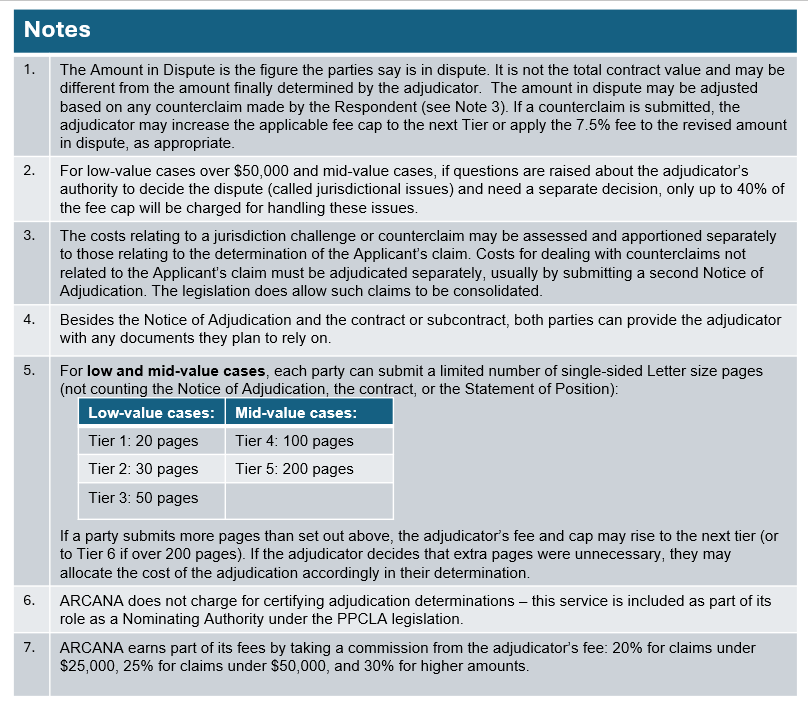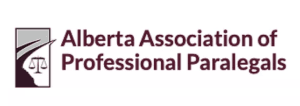- Menu
- Skip to right header navigation
- Skip to primary navigation
- Skip to main content
- Skip to primary sidebar
- Skip to footer
- Who We Are
- What We Do
- Membership
- Designations
- Events
- Publications
- Directory of ADR Professionals


Effective April 19, 2023, Service Alberta announces ARCANA (AB) as a Nominating Authority for Construction Adjudication Prompt Payment
As of February 1, 2026, the ARCANA (AB) fee schedule has been updated, along with the Notice of Adjudication.
ARCANA Annual Reports
Please click on the link above to access the PDF Annual Reports.
While amounts owing of under $15K may represent a substantial sum to many contractors, Applicants are cautioned that ARCANA (AB) construction adjudication services are not free. Appointment and adjudicator fees begin at almost $3000, and are often initially borne by the Applicant. The Adjudicator may or may not allocate the cost of the adjudication in any one party’s favour. For those collecting on an Adjudicator’s order, ARCANA (AB) does not provide enforcement services when debts remain unpaid, potentially incurring more cost to those owed money. ARCANA (AB) wants such Applicants to be fully aware of ALL their resolution options:
1) Prompt Payment Construction Adjudication with ARCANA (AB) as detailed in these webpages;
2) Civil Claims Mediation or Litigation, with or without legal representation, for sums up to $100,000. There are additional details regarding this option that you can access from this ARCANA (AB) webpage. Application fees are very low, and Applicants are strongly encouraged to request the FREE mediation option which can achieve resolution faster without added expense; and
3) Register a Lien. ARCANA (AB) does not provide advice or guidance on this option, but note that liens must be registered within 60 days. Registering a lien does not preclude, supercede, or interrupt an ARCANA adjudication process. In fact, the concluded adjudication may well resolve the issue(s) that give rise to lien.
Overview
The construction industry is a multi-billion dollar sector of Alberta’s economy that creates thousands of jobs for Albertans.
Payment timelines for Alberta’s construction industry, along with timelines for filing liens and rules for adjudication in the event of a payment dispute, are outlined in the Prompt Payment and Construction Lien Act, the Prompt Payment and Adjudication Regulation, and the Prompt Payment and Construction Lien Forms Regulation.
All new construction contracts in Alberta must adhere to the rules of the Prompt Payment and Construction Lien Act as of August 29, 2022.
Existing contracts that are scheduled to end before August 29, 2024 do not need to be changed to adhere to the new rules. Existing contracts that extend beyond August 29, 2024 have to become compliant by August 29, 2024.
A roster of ARCANA (AB) Qualified Adjudicators is now posted. Only these adjudicators are allowed to conduct Prompt Payment Construction Adjudications in accordance with the legislation.
Please note that contacting an adjudicator directly will compromise their ability to accept a file. If you must contact an adjudicator to confirm any aspect of their qualifications, suitability or experience, please do so by email and carbon copy (cc) the other party and their legal representative. Any potential adjudicator will, in turn, Respond to All without compromising their neutrality.

Adjudicator (Q. Adj. Const.) | Calgary
Specializes in:
Construction / Engineering
Adrianna Worman has over fifteen years of experience in construction litigation and dispute resolution, contract review and development. Adrianna handles a myriad of matters for and against general contractors, construction…. View Profile
ADR Services:
Construction Adjudicator
Location Availability:
Online, Calgary Area, Edmonton Area, Southern Alberta

ADR Services:
Construction Adjudicator
Location Availability:
Online

Adjudicator (Q. Adj. Const.) |
Specializes in:
Construction / Engineering
David Simpson is a seasoned construction professional with 20 years of experience in bid-build and design-build delivery methods, working with owners, general contractors, subcontractors, and consultants. He has held senior…. View Profile
ADR Services:
Construction Adjudicator
Location Availability:
Online

Adjudicator (Q. Adj. Const.) | Calgary
Specializes in:
Construction / Engineering
Barrie Marshall is a retired lawyer and was, until June 2019, a partner with the Calgary office of Gowling WLG (Canada) LLP. Barrie spent his entire career practising commercial litigation,…. View Profile
ADR Services:
Construction Adjudicator
Location Availability:
Online, Calgary Area, Central Alberta, Edmonton Area, North Eastern Alberta, North Western Alberta, Southern Alberta, Out-of-Province

Arbitrator (Q.Arb), Adjudicator (Q. Adj. Const.) | Edmonton
Specializes in:
Civil Claims, Condominium, Construction / Engineering, General Practice
Mr. Jessamine is a pioneer with 25 years of experience in the fields of construction and alternative dispute resolution and is a former member of the board of directors of…. View Profile
ADR Services:
Arbitrator, Construction Adjudicator
Location Availability:
Calgary Area, Central Alberta, Edmonton Area, North Eastern Alberta, North Western Alberta, Southern Alberta, Out-of-Province

ADR Services:
Construction Adjudicator
Location Availability:
Online

| Calgary
Specializes in:
Civil Claims, Condominium, Construction / Engineering, Corporate & Commercial, General Practice, Landlord & Tenant
Civil claims Court Agent with 1000 hours of trial experience encompassing hundreds of litigations. University of Calgary graduate in 2020 with Batchelor’s Degree in Law & Society and a Minor…. View Profile
ADR Services:
Construction Adjudicator
Location Availability:
Online, Calgary Area, Central Alberta, Edmonton Area, North Eastern Alberta, North Western Alberta, Southern Alberta, Out-of-Province

Adjudicator (Q. Adj. Const.) |
Specializes in:
Construction / Engineering
Kevin Magill is a Construction Consultant with over 35 years experience gained in various industry sectors, including healthcare, energy, learning facilities and commercial and residential projects. Kevin started his career as an…. View Profile
ADR Services:
Construction Adjudicator
Location Availability:
Online, Calgary Area, Central Alberta, Edmonton Area, North Eastern Alberta, North Western Alberta, Southern Alberta, Out-of-Province

Arbitrator (C.Arb), Adjudicator (Q. Adj. Const.) | Toronto
Specializes in:
Construction / Engineering, Energy / Oil & Gas
Matt Mortazavi has 35+ years of hands-on experience in general contracting, construction, and project management. He has extensive experience in residential (low and high-rise), infrastructures such as railway transit, underground…. View Profile
ADR Services:
Arbitrator, Construction Adjudicator
Location Availability:
Online, Calgary Area, Central Alberta, Edmonton Area, North Eastern Alberta, North Western Alberta, Southern Alberta, Out-of-Province

Arbitrator (C.Arb), Mediator (C.Med), Adjudicator (Q. Adj. Const.) | Calgary
Specializes in:
Agriculture, Civil Claims, Condominium, Construction / Engineering, Corporate & Commercial, Education, Employee Assistance Programs, Energy / Oil & Gas, Environment, Family / Eldercare / Parent & Teen, Family Business, General Practice, Government, Healthcare, Insurance Claims, Labour, Land Use, Landlord & Tenant, Real Estate, Sports, Wills & Estates, Workplace
Background Mike is a formally trained mediator, arbitrator and adjudicator with an extensive educational background in Alternative Dispute Resolution. In addition to his extensive practice as a civil litigator, he…. View Profile
ADR Services:
Arbitrator, Mediator, Construction Adjudicator, Divorce & Separation Mediator
Location Availability:
Online, Calgary Area, Central Alberta, Edmonton Area, North Eastern Alberta, North Western Alberta, Southern Alberta, Out-of-Province

Arbitrator (C.Arb), Mediator (C.Med), Adjudicator (Q. Adj. Const.) | Edmonton
Specializes in:
Construction / Engineering, Corporate & Commercial, Sports, Wills & Estates, Workplace
Michelle is a Chartered Arbitrator, Chartered Mediator and a Certified Construction Adjudicator. Michelle has been an Alberta lawyer since 1982. Michelle’s legal background blends well with the services she provides…. View Profile
ADR Services:
Arbitrator, Mediator, Construction Adjudicator
Location Availability:
Online, Calgary Area, Central Alberta, Edmonton Area, North Eastern Alberta, North Western Alberta, Southern Alberta, Out-of-Province

Arbitrator (Q.Arb), Mediator (Q.Med), Adjudicator (Q. Adj. Const.) | Toronto
Specializes in:
Construction / Engineering, Energy / Oil & Gas
Paul is both a federal (CanDACC) and provincial adjudicator, since 2020 he has had over 40 appointments with ODACC, ARCANA, SCDRO and the Ontario Ministry of Transportation. He is a…. View Profile
ADR Services:
Arbitrator, Mediator, Construction Adjudicator
Location Availability:
Online, Calgary Area, Central Alberta, Edmonton Area, North Eastern Alberta, North Western Alberta, Southern Alberta, Out-of-Province

Adjudicator (Q. Adj. Const.) | Ottawa, ON
Specializes in:
Construction / Engineering
Robert Bales is an engineer and project manager, and a construction lawyer. After 30 years in construction, including related legal services, he now acts exclusively as an adjudicator on both…. View Profile

Arbitrator (Q.Arb), Mediator (Q.Med), Adjudicator (Q. Adj. Const.) | Calgary
Specializes in:
Construction / Engineering
Roy McPhail is a professional engineer (P. Eng.) with 51 years of experience in construction and construction dispute resolution serving both public and private sectors domestically and internationally. He has…. View Profile
ADR Services:
Arbitrator, Mediator, Mediator-Arbitrator, Construction Adjudicator
Location Availability:
Online, Calgary Area, Central Alberta, Edmonton Area, North Eastern Alberta, North Western Alberta, Southern Alberta

Adjudicator (Q. Adj. Const.) |
Specializes in:
Construction / Engineering
Stephen Carter-Edwards, J.D., P. Eng., was a hybrid litigator and solicitor having retired after 21 years. He practised in the area of commercial litigation and contract drafting. His practice focused…. View Profile
ADR Services:
Construction Adjudicator
Location Availability:
Online, Calgary Area, Central Alberta, Edmonton Area, North Eastern Alberta, North Western Alberta, Southern Alberta

Arbitrator (Q.Arb), Adjudicator (Q. Adj. Const.) | Nelson
Specializes in:
Construction / Engineering
Tim is a highly experienced barrister, and over the years, he has cultivated a rich and diverse practice in most areas of litigation, including construction disputes. Tim’s background includes mixed…. View Profile
ADR Services:
Arbitrator, Construction Adjudicator
Location Availability:
Online, Calgary Area, Central Alberta, Edmonton Area, North Eastern Alberta, North Western Alberta, Southern Alberta, Out-of-Province
Our Fee Schedule is Updated!!! Effective from February 1 2026.
Prompt Payment Construction Adjudications under the PPCLA Legislation are intended to provide the construction sector and the public with quick, accessible, affordable and enforceable Determinations and Orders – usually in under 60 days. The PPCLA allows disputants in the construction sector to avoid lengthy and costly litigation in the Courts.
Please add 5% GST to all fees specified in the ARCANA (AB) Fee Schedule below:


As noted in the fee schedule the appointed adjudicator may require a retainer to be paid when the adjudication is initiated. While it is preferable that the disputing parties share the cost of the retainer, in order to ensure that the adjudication can proceed without delay, the applicant should be prepared to pay the full cost at the outset. Note that Regulation 13(3) specifies that any costs and other charges related to an adjudication shall be equally divided among the parties unless the adjudicator directs otherwise. ARCANA (AB) requires its adjudicators to carefully consider whether these cost should be shared equally or unequally, and to include this decision in the Adjudication Order in compliance with Regulation 26(2).
In accordance with section 13(3) of the PPCLA Regulation 23/2022 dated February 25, 2022, when making their Determination and Order regarding the cost and other charges related to the adjudication, ARCANA adjudicators shall be limited to the following:
a. Admin fee(if applicable) paid by the parties to ARCANA(AB): and
b. Fees and disbursements charged by the Adjudicator to the parties including any costs incurred by the Adjudicator arising from any of the powers exercised in accordance with section 25(1) of the PPCLA Regulation.
For the payment of Admin Fee, please contact: arcana@adralberta.com
We have an updated Notice of Adjudication!!
There is no fee to issue a Notice of Adjudication but, once issued, it is incumbent upon the Applicant to immediately:
A) Work towards resolution with the Respondent if practical;
B) If not resolved, try to agree upon an adjudicator; and Keep ARCANA (AB) informed.
ARCANA AB will send you a the next steps once the Notice of Adjudication is received.
If the adjudication is going ahead, you must complete the steps listed above within four working days of issuing the Notice. This includes paying the admin fee, if applicable, (refer to ARCANA (AB) fee schedule and the Notes for details).
If the dispute is resolved or the adjudication is discontinued after the Notice has been issued, you must inform ARCANA(AB).
For details on how to pay the admin fee, please contact arcana@adralberta.com.
Once appointed, the adjudicator will issue further instructions in accordance with the legislated timelines.
The PPCLA legislation and regulation uses the terms “days” and “calendar days” to outline the adjudication process. Note that under the legislation “Calendar days” excludes weekends and most recognized holidays. The 11-step process below only uses the word “days”, noting that in most cases (but not all), this refers to working days. A notable exception is Regulation 26(1) [Step 4] where ARCANA(AB) believes that the legislated intent is 30 straight days – i.e. including weekends and holidays. For added clarity, refer to the legislation.
Step 1 – Commencement
Action – The Applicant delivers a Notice of Adjudication to the Respondent and the Nominating Authority in the required form.
Includes a brief description of the dispute being submitted to for adjudication, details of the preferred adjudicator and the redress sought (usually expressed to include a dollar value).
Step 2 – Select an Adjudicator (or not)
Action – If practical, the Applicant and Respondent agree on the Adjudicator and notify the Nominating Authority.
Or, if agreement cannot be mutually agreed upon by the parties, any party to the dispute (normally the Applicant) must notify the Nominating Authority that they have been unable to reach an agreement on the selection of an Adjudicator, and request the Nominating Authority to appoint an Adjudicator on their behalf.
Timing – within 4 days of the delivery of the Notice of Adjudication, at which time the Admin fee must be paid if applicable based on the tier. For the payment of Admin Fee, please contact: arcana@adralberta.com
NOTE – if the Applicant does not intend to proceed to adjudication after the 4th day, the Nominating Authority must be advised immediately.
The parties are encouraged to communicate with each other during these 4 days and mutually agree upon an Adjudicator. To this end, the parties are encouraged to identify and exclude any Adjudicators that might have a Conflict of Interest, or be otherwise les suitable for the dispute at hand. Similarly, any party can communicate their preferences for an appointed Adjudicator. Direct one-party written or verbal communications with potential Adjudicators are NOT encouraged, as such communications would compromise the Adjudicator. If direct written communications with potential Adjudicators are initiated by any party prior to the appointment, then all other parties to the dispute must be copied.
In all circumstances, the Nominating Authority will confirm the availability, suitability, and willingness of the Adjudicator before appointing.
Step 3 – Appointment by the NA
Action – The Nominating Authority appoints either the Adjudicator agreed to by the parties, or an Adjudicator who the Nominating Authority deems qualified to adjudicate the dispute between the parties, and notifies the parties of the appointment.
The adjudicator may issue directions to the parties at this stage regarding the conduct of the adjudication. Such directions may also be issued during the course of the adjudication process (see Step 6 below).
Timing – within 7 days of Step 2.
Step 4 – Submission of Materials by Applicant
Action – The Applicant must deliver to the Adjudicator and the Respondent, the following materials:
•The Notice of Adjudication;
•A copy of the contract or subcontract, as the case may be; and
•Copies of all documents that the Applicant intends to rely on to prove its claim.
While submitting the documents, please take care of the number of pages outlined in the notes of the fee schedule.
The documents should include a brief summary of the basis for the Applicant’s claim.
ARCANA (AB) provides a secure document transmission platform – Sharepoint
Timing – within 5 days of the appointment of the Adjudicator under Step 3, or such other time as may be directed by the Adjudicator.
This starts the 30-day clock i.e. the timeframe within which the adjudicator must make a determination of the dispute, unless extensions are granted
Step 5 – Submission of Materials by Respondent
Action – The Respondent must deliver to the Adjudicator, and the Applicant, its response which should include the following materials:
•A brief description of the basis upon which the Respondent disputes the Applicant’s claim; and
•Copies of all documents that the Respondent intends to rely on to dispute the Applicant’s claim.
Timing – within 12 days of receipt of the Applicant’s materials under Step 4, or such other time as may be directed by the Adjudicator.
Step 6 – Adjudicator’s Notifications/Directions
Action – At the Adjudicator’s discretion, the Adjudicator may issue directions to, or seek clarifications from, the parties to the dispute.
The Adjudicator shall also give notice to the parties that the Adjudicator has in its possession all the documents and information required to make a determination.
This is where a site visit, hearing or expert witness could be directed.
Timing – In Adjudicator’s discretion
Step 7 – Determination and Order
Action – The Adjudicator delivers to the parties and to the Nominating Authority their written determination of the dispute and a corresponding formal Order.
Timing – within 30 days of receipt of the materials from the Applicant under Step 4.
The Adjudicator may extend this timeline (or any deadline) by up to 10-day increments if necessary or by agreement.
In accordance with section 13(3) of the PPCLA Regulation 23/2022 dated February 25, 2022, when making their Determination and Order regarding the cost and other charges related to the adjudication, ARCANA adjudicators shall be limited to the following:
a. Admin fee paid by the parties to ARCANA(AB): and
b. Fees and disbursements charged by the Adjudicator to the parties including any costs incurred by the Adjudicator arising from any of the powers exercised in accordance with section 25(1) of the PPCLA Regulation.
Step 8 – Corrections
Timing – within 4 days after Determination is made the parties to the adjudication must seek a correction of any typographical error in the Order.
Step 9 – NA Certification
Action – The Nominating Authority certifies the Order and sends a copy of the Order to the parties.
Timing – within 7 days of the Nominating Authority’s receipt of the determination and Order under Step 7.
Step 10 – Enforcement
Action – The party seeking enforcement of the Order may file the Order with the Clerk of the Court.
When filed with the Clerk of the Court, the Order has the same legal effect as an Order of the Court.
Timing – If unpaid, 30 days after the delivery of the certified determination and Order of the Adjudicator from the NA under Step 9.
OR – Judicial Review is requested within this same 30 days.
Step 11 – Notification of Enforcement
Action – Party seeking enforcement of the Adjudicator’s Order delivers to the other party written notice of the registration of the Order with the Clerk of the Court.
Timing – within 10 days of the registration of the Order under Step 10.
Under the PPCLA, a Nominating Authority is required to:
assess applicants against the prescribed requirements as adjudicators;
appoint adjudicators and arrange for them to adjudicate specific disputes;
develop and oversee programs for adjudicator training;
establish and maintain a publicly available registry of adjudicators; and
perform any other duties as may be prescribed by regulation.
The Nominating Authority ARCANA (AB) functions as a partnership between the ADR Institute of Alberta (ADRIA), the ADR Institute of Canada (ADRIC), and the Royal Institution of Chartered Surveyors (RICS).
For more information on Prompt Payment Construction Adjudication or how to initiate the adjudication process, contact arcana@adralberta.com or call/text 780-245-4042.
An alternative and cost-effective option for smaller construction prompt payment disputes is Civil Claim Court, and free mediation services that the parties can request or be directed to. Claims of up to $100,000 can be referred to the Alberta Court of Justice Civil Division. Filing fees are low, and many such files are diverted to a half day of free mediation – especially when mediation is requested by the applicant or parties to the dispute. Successful mediated outcomes can be filed as court documents, and mediations can be scheduled much earlier than court dates. If a mediated settlement is not reached, you can still proceed to trial. You can find full details on the following websites:
https://albertacourts.ca/cj/areas-of-law/civil/claims/filing
https://www.alberta.ca/civil-mediation.aspx
Neither the Courts nor ARCANA (AB) provide enforcement services. Any party to a dispute that is still owed payment more than 30 days after a construction adjudicator’s order is certified should consult Steps 10 and 11 of the 11-step ARCANA (AB) Adjudication process AND the attached guide. Legal counsel is recommended.
Complaints and Discipline Policy
Each of the three partners of ARCANA (AB) currently maintains its own Complaints and Discipline Policies. Steps are currently underway to harmonize these policies with a view to the adoption of single, harmonized ARCANA (AB) Complaints, Determination and Discipline Policy for Construction Adjudication. While all three policies rely on Fairness, due process and the fundamentals of Natural Justice, RICS has the most experience with Construction Adjudication and the nature of complaints that may arise. For this reason, ARCANA (AB) will initially rely on a modified RICS policy, engaging both ADR Institutes, should there be an early complaint. The GOA will be advised as soon as a harmonized policy is adopted.
Interim ARCANA (AB) Complaints Policy
Complaints Procedure (CP) Content Outline:
1. Overview
· Purpose of the customer complaints procedure
2. Matters that may investigated
· Background
· Types of complaints ARCANA (AB) can investigate
· Types of complaints ARCANA (AB) cannot investigate
3. The investigation
· Costs
· What happens during the investigation?
· Potential outcomes
4. Practical information
· Contact details
· Time limits
· Withdrawal of a complaint
Overview
Purpose of this complaint procedure
ARCANA (AB) has adapted this complaints procedure on an interim basis to ensure that those parties who use the services of ARCANA (AB) to source the nomination of construction adjudicators, continue to have confidence in the professionalism and competence of the services we provide and the adjudicators we nominate.
All adjudicators who are nominated by ARCANA (AB), or are on the ARCANA (AB) roster of adjudicators, and hold themselves out as being able to discharge the role of adjudicator, are covered by this complaint procedure.
The purpose of this policy is to ensure that parties to an adjudication, their professional representatives and adjudicators on the ARCANA (AB) roster are fully aware of the procedure that will be followed when a complaint has been received regarding an adjudication or adjudicator.
This document provides an explanation of the matters that are within the scope of the complaint procedure, a step-by-step guide to the process of investigation that will take place, and a summary of recourse or corrective measures that can be considered.
Matters that may be investigated
This procedure for investigating complaints applies to all adjudicators who are on the ARCANA (AB) roster.
We may, at our discretion, refer an allegation relating to the personal and/or professional conduct of an adjudicator to their professional regulatory body, if applicable. Such a referral may, in addition to any steps taken by ARCANA (AB) under this complaint procedure, lead to disciplinary action against the dispute resolver. Examples of conduct which may fall within this category include demonstrations of abuse (verbal/physical), discriminatory or biased behavior, or a deliberate or reckless failure to declare a conflict of interest.
ARCANA (AB) has an unfettered discretion as to who is or is not included on the roster of adjudicators and can decide whether or not to temporarily, or permanently, remove any adjudicator from the roster. Normally, a decision to remove an adjudicator from the roster will be taken to safeguard the interests of parties to adjudications.
Types of complaints ARCANA (AB) can investigate
We can investigate complaints relating to the competencies reasonably expected of an adjudicator on the ARCANA (AB) roster. For example:
a) Inadequate case management including inadequately setting out and communicating the process at the outset; haphazardly requesting paperwork; inefficiently organizing evidence and representations; failing, as far as possible, to ensure that all information provided by the parties or obtained by his or her own efforts, is equally shared with all parties to a dispute
b) Poor time management including failing to adhere to relevant prescribed timetables and time limits; repeatedly cancelling meetings without good reason; late billing of costs (including fees)
c) Complaints relating to an adjudicator’s personal and/or professional conduct in the course of acting as an adjudicator in respect of the parties or others associated with the adjudication process but not directly integral to the decision-making process itself.
Types of complaints ARCANA (AB) cannot investigate
ARCANA (AB) authority does not extend to any issue relating to:
a) The merits or otherwise of decision by the adjudicator on the substantive disputes. This includes the reasoning provided by the adjudicator for the decision; the inclusion or exclusion of, or weight given, to evidence; any matters that go to the merits of rulings by the adjudicator on their jurisdiction or other preliminary or ancillary matters;
b) The reasonableness of an adjudicator’s decision on allocation of costs (if applicable);
Continuing, ARCANA (AB) may not:
c) Enquire into, or in any way interfere with, any on-going dispute resolution process, such as arbitration or litigation;
d) Order an adjudicator to revisit, change, or withdraw a decision; or
e) Consider any allegation of professional negligence relating to the decision of an adjudicator or to instruct an adjudicator to pay compensation based on alleged negligence or any other cause of action.
These issues may only be determined by a Court of Law.
The Investigation
Costs
There is no charge made to either a complainant or adjudicator for a complaint to be lodged with ARCANA (AB), or for undertaking an investigation into a complaint.
What happens during the investigation?
ARCANA (AB) will always attempt to contact the adjudicator by telephone in the first instance to inform him/her that a complaint has been received. In the event that we are unable to speak with the adjudicator, an email will be sent.
Should ARCANA (AB) consider that the complaint does not fall within our remit, a response will be sent to the complainant which will explain the reasons why we are unable to pursue the matter further. The adjudicator may be informed of this outcome, only if he or she has been notified of the complaint before the decision has been made not to pursue the matter.
If ARCANA (AB) considers that all or part of a complaint falls within our remit, the following procedure will be undertaken:
a) ARCANA (AB) will invite the adjudicator to respond to the complaint in writing and we will give a deadline date for the response. A full copy of the complainant’s correspondence will be provided to the adjudicator to ensure they are aware of the issues that need to be addressed. Please note the deadline to respond may be extended by request.
b) ARCANA (AB) will consider any response received from the adjudicator and inform both the complainant and the adjudicator of the next steps.
c) ARCANA (AB) may at any stage seek advice from others within or outside of RICS ADRIC. This may include professionals experienced in adjudication law, practice and procedures, or in the subject matter of the complaint.
d) ARCANA (AB) may at any stage contact the other party or parties to the adjudication and may at our sole discretion seek their comments and observations on the matters raised in the complaint.
e) ARCANA (AB) will consider the matter further and make a decision. We will write to the complainant, the adjudicator and, if appropriate, any other parties to advise them of the outcome.
Potential outcomes
The purpose of an investigation is to ensure the excellence of service provided by the adjudicators appointed by ARCANA (AB). Our objective is therefore not necessarily to punish, but to ensure that adjudicators are fully aware of and at all times act in full compliance with the high standards required of them by ARCANA (AB). Possible outcomes include:
Where an adjudicator has made a minor error in practice or procedure, and the complaint overall is not considered serious, he/she will be given advice and guidance on how to proceed in future disputes where he/she is appointed, so as to avoid similar complaints
Where an adjudicator has not discharged his/her role adequately and this has inconvenienced a complainant, but has not caused serious disadvantage, he/she may be warned as to future conduct, and notified that any further failures to perform adequately could result in suspension or removal from the roster from which appointments are made
Where an investigation determines that an adjudicator is significantly weak in a particular area, he/she may be suspended from the roster from which appointments are made until such time as ARCANA (AB) is satisfied that he/she has addressed the matter through training/coaching.
In addition, all adjudicators undertake regular reassessments, and where a complaint has been received, ARCANA (AB) may bring the complaint to the attention of the Reassessment Board for consideration.
Where an investigation uncovers serious shortcomings in terms of the ability of an adjudicator to discharge his/her role, and ARCANA (AB) considers that the shortcomings have not, or cannot, be resolved by further training or coaching, ARCANA (AB) may remove an adjudicator from the roster from which appointments are made.
Practical information regarding complaints
ARCANA (AB) contact details
Should you be asked by ARCANA (AB) to provide further information or to respond to a complaint, please reply directly to the member of staff who has written to you.
Please note that, while ARCANA (AB) will offer state-of-the-art confidentiality via BOX relating to file correspondence in each and every complaint, no email system can be
guaranteed to be 100% secure. ARCANA (AB) cannot be held responsible for email service/internet system failures and/or downtime.
Time limits
A complaint must be made within twelve months of the act(s) complained of, or twelve months of the completion of the appointment, whichever is the later. (In exceptional circumstances, ARCANA (AB) may extend this time limit).
In most circumstances, a complaint can only be investigated where the adjudication (including any decision as to costs) has been completed and any appeal process exhausted. A complaint cannot normally be investigated until any active legal action against the adjudicator has been finalized.
Withdrawal of a complaint
Should a complaint be withdrawn or resolved informally, ARCANA (AB) may inform the adjudicator in writing.
ADDITIONAL REFERENCES:
RICS – Raising Concerns about Regulated Members:
https://www.rics.org/uk/footer/contact-us/concerns/
ADRIC – Complaints & Discipline Policy:
ADRIA – Complaint Resolution Policy:

The partnership between the ADR Institute of Alberta (ADRIA), The ADR Institute of Canada, Inc. (ADRIC) and the Royal Institution of Chartered Surveyors (RICS) as the ADR Institutes / RICS Construction Adjudication Nominating Authority (Alberta) [ARCANA (AB)] brings together three organizations with long-established records of performance in the development and implementation of dispute resolution services in many commercial sectors, notably construction.

The Royal Institution of Chartered Surveyors (RICS) is a global leader in the provision of adjudication services to the construction industry and has nominated in excess of 20,000 adjudicators over the past 24 years pursuant to statutory and contractual regimes in the UK, Australia, New Zealand, Southern Africa and the Republic of Ireland. The RICS training, accreditation and performance monitoring programs for construction adjudicators are regarded as the gold standard by industry professionals and users of adjudication globally. https://www.rics.org/

The ADR Institute of Canada (ADRIC) is Canada’s leading ADR professional organization and presides as the national body of the seven regional affiliate bodies of the ADR Institutes in Canada. It has established benchmarks for best practice for ADR professionals across Canada and offers highly respected and sought-after professional designations. ADRIC members include Canada’s top dispute resolution professionals many of whom are skilled and experienced in construction industry law and practice. ADRIC and RICS have also partnered at the Federal level with the intent of responding to the Canadian Government’s Prompt Payment Adjudication legislation, and are working with individual Affiliates across Canada to support existing and future Provincial Construction Adjudication initiatives. https://adric.ca/

The ADR Institute of Alberta (ADRIA) is well known to the Provincial Government as Alberta’s professional association of mediators, arbitrators, adjudicators and other ADR practitioners, and the source of ADR expertise in Alberta. ADRIA functions as an independent Regional Affiliate of ADRIC in the delivery of highly qualified and credentialed ADR professionals in all sectors of Alberta’s economic and civil life. For over 20 years ADRIA has administered the Canadian Motor Vehicle Arbitration Plan (CAMVAP) in Western Canada, in partnership with the CAMVAP national body. ADRIA has represented the new ARCANA (AB) partnership throughout Service Alberta’s consultation process and the drafting of prompt payment adjudication legislation and directives. https://adralberta.com/
ARCANA (AB) hosted a highly successful Construction Adjudication Prompt Payment Symposium on April 20th, 2023 in Calgary, featuring speakers from the UK and multiple Provinces. Symposium activities for 2024 are now being planned. Visit https://adralberta.com/events/construction-adjudication-symposium/ or contact arcana@adralberta.com for more details and sponsorship opportunities.
Anyone interested in joining the ARCANA (AB) roster of professional construction adjudicators must have at least 10 years of experience in the construction sector, as required by the PPCLA Regulation. Applicants must also register and complete the National ADR Canada / RICS online Construction Adjudication Training Program. When a session is scheduled, details can be found on the ADRIA and ADRIC websites, or by contacting arcana@adralberta.com .
Construction adjudication training will cover the Alberta legislation (and other jurisdictions), and is the minimum training requirement for construction adjudicators in Alberta accepted onto the ARCANA (AB) roster. Please note that completion of this training is not a guarantee of acceptance on the Alberta roster, as ARCANA (AB) is required to offer a balanced roster covering a broad spectrum of construction sector and legal expertise. Roster adjudicators are also required to hold an ADRIA membership, professional insurance and maintain their professional designations.
Overall, feedback from ADRIA applicants and clients has been largely positive, with several user suggestions successfully incorporated to improve the program and website. Additionally, the recently implemented post-determination survey has yielded encouraging feedback and testimonials. One testimonial stands out as especially meaningful—despite the adjudication being discontinued due to jurisdictional reasons, it still helped initiate dialogue and pave the way for resolution:
“We chose to initiate an adjudication under the Prompt Payment and Construction Lien Act (PPCLA). Although the adjudication ultimately didn’t proceed due to a jurisdictional challenge, the process of preparing and exchanging documents gave all parties a clearer understanding of the issues. As a result, both the Owner and the Prime Contractor came back to the negotiating table. Discussions are ongoing, and I’m optimistic that we’re close to a resolution.
One key takeaway is this: adjudication isn’t just for prompt payment or unpaid invoices. Under the PPCLA, you can adjudicate a wide range of construction-related disputes. That includes the valuation of work or materials—whether it’s base scope or part of a written or proposed change order, approved or not. It can also be used for payment issues, holdback disputes (major or minor lien fund), and even delay claims or general contract disputes—so long as they relate to the construction contract. And if both parties agree, you can adjudicate virtually any issue under the contract, whether or not it stems from a formal invoice or lienable work.
Another important point: parties can’t contract out of adjudication under the PPCLA. That means many of the delay tactics historically used to drag out payment and dispute resolution are no longer viable.
The PPCLA provides powerful tools for all stakeholders in the construction industry—including Owners, Architects, Engineers, Contract Administrators, Contractors, Subcontractors, and Suppliers—to resolve payment issues and disagreements efficiently and cost-effectively. It promotes transparency, accountability, and timely resolution, which benefits the entire project ecosystem.
This process has real potential to change how disputes are resolved in Alberta’s construction industry. All stakeholders—including the Nominating Authority and adjudicators—should be actively looking for opportunities to use the PPCLA and to inform and educate the industry about its benefits. I strongly encourage other contractors and subcontractors to take the time to understand what the PPCLA offers—and to use it.”
Disclaimer: The content of these FAQ’s is provided for information purposes only and is not intended as legal advice. Users of adjudication should familiarize themselves with the current legislation and regulations.
Answer: An adjudication is commenced by the party seeking the adjudication (the “Applicant”) completing and giving to both the other party to the dispute (the “Respondent”) and ARCANA(AB) a “Notice of Adjudication” (See section 20 of the Prompt Payment and Adjudication Regulation (the “Regulation”). This notice can be accessed on the ARCANA(AB) webpage https://adralberta.com/prompt-payment/.
2. What are the key deadlines for Applicants and Respondents in an adjudication once it has been commenced?
Answer: Within first 4 days of commencement of the Adjudication – The Applicant and Respondent are to discuss, and possibly, agree upon an adjudicator selected from ARCANA(AB)’s roster of adjudicators which can be found at https://adralberta.com/prompt-payment/ (See section 22(1) of the Regulation).
Within 7 days of selection of the adjudicator by the parties or expiry of the 4 day period above – ARCANA(AB) appoints the adjudicator – either the adjudicator agreed upon by the Applicant and Respondent or, in the absence of agreement, chosen by ARCANA(AB) based upon the issues in the dispute (see section 22(2) of the Regulation).
Within 5 days of appointment of the Adjudicator – the Applicant must provide to the Adjudicator: (1) a copy of the Notice of Adjudication and (2) a copy of the contract or subcontract as the case may be. (3)The Applicant must also provide to both the adjudicator and the Respondent copies of any documents the Applicant intends to rely on during the adjudication. These documents should include a brief narrative explaining the basis of the Applicant’s claim. (See section 23 of the Regulation).
Within 12 calendar days of receipt of the Applicant’s materials: The Respondent must provide a response to the Applicant’s materials to the adjudicator and the Applicant. This response should contain copies of any documents the Respondent intends to rely on in the adjudication together with a brief narrative explaining the basis of the Respondent’s defence to the Applicant’s claim.
N.B. An adjudicator can extend the deadlines of the Applicant and/or Respondent one or more times, at the request of either or both of the parties, for a period of up to 10 days. Such requests should come with an explanation.
Further deadlines and steps in the adjudication process can be found on the ARCANA(AB) webpage https://adralberta.com/prompt-payment/.
3. What matters can an adjudicator adjudicate, ie. What matters are within an adjudicator’s jurisdiction?
Answer: An adjudicator can only adjudicate disputes which relate to construction contracts, ie. contracts which give rise to an improvement to land. Furthermore, an adjudicator can only adjudicate disputes that pertain to property in Alberta. Otherwise, an adjudicator cannot adjudicate a dispute where the dispute has been referred to adjudication after 30 days from the “date of final payment” (See section 33.4 of the Prompt Payment and Construction Lien Act (the “Act”). “Final Payment” is a defined term in the Act with a number of important exceptions to what payments constitute “final payment”. Legal advice should be obtained regarding the interpretation and application of this provision. An adjudicator may also be able to adjudicate a dispute regardless of when an action is commenced in court regarding that dispute. Legal advice should also be obtained in this regard as there is some lack of clarity in the Act regarding the amendments concerning adjudication and court actions. See sections 33.4(1) and (5) of the Act).
Otherwise, an adjudicator’s jurisdiction is set out in section 19 of the Regulation which provides that an adjudicator can resolve disputes regarding the following matters:
-
The valuation of services or materials provided under the contract or subcontract, including in respect of a written change order, whether approved or not, or a proposed change order, as the case may be;
-
Payment under the contract or subcontract, including in respect of a written change order, whether approved or not, or a proposed change order;
-
Disputes that are the subject of a notice of non-payment under Part 3 of the Act;
-
Payment of non-payment of an amount retained as a major lien fund or minor lien fund and owed to a party during or at the end of a contract or subcontract as the case may be;
-
Any other matter in relation to the contract or subcontract, as the case may be, that the parties to the dispute agree to, regardless of whether or not a proper invoice was issued or the claim is lienable.
4. What should I include in my submissions to the adjudicator as either an Applicant or a Respondent?
Answer: See the answer to FAQ # 2 above. Parties should keep their submissions concise, but addressing each aspect of the party’s position, and including only the key documents supporting their positions. They should keep in mind that the adjudicator is seeing the dispute, and the relevant documents, for the first time and that the adjudicator has a limited time in which to make his/her determination.
5. If I obtain an adjudicator’s determination in my favour how do I enforce it?
Answer: A party receiving a determination with an order which directs that a payment be made can enforce that order by filing it with the Clerk of the Court. The order cannot be filed with the court until 30 days following receipt of the adjudicator’s order by the parties (See section 33.61 of the unamended and amended Act). Thereafter it can be enforced in the same manner as any court order. Further information in this regard can be found on the ARCANA(AB) webpage https://adralberta.com/prompt-payment/ . ARCANA(AB) and the adjudicator lack the jurisdiction to assist the parties with enforcement of an adjudicator’s order.
6. If I obtain an adjudicator’s determination in my favour is it inevitable that the dispute goes to litigation in any event?
Answer: No. A court action can be commenced by either party to a dispute following (or even during the course of) an adjudication. However, that court action does not affect the enforceability or binding effect of the determination and order. That determination and order only become unenforceable, thereby requiring either litigation or arbitration to resolve the dispute, under the following circumstances:
A court order is made affecting the binding nature of the determination and order (ie. a stay) or resolving the same dispute.
-
The issuance of a court order setting aside the determination and order at an application for judicial review.
-
An arbitration has commenced and is in progress under the Arbitration Act..
-
The issuance of an award by an arbitrator respecting the same dispute.
-
The parties have entered into a written agreement that resolves the matter in dispute.
(See sections 33.6(5) and 33.61 of the amended Act).
7. Is the issuance of a “proper invoice” necessary before a dispute can be resolved by an adjudicator?
Answer: No. The jurisdiction of an adjudicator is as set out in the answer to FAQ # 3 above. Only one of those areas of jurisdiction relates to the issuance of a “proper invoice”, namely, section 19(c), ie. “disputes that are the subject of a notice of non-payment under Part 3 of the Act”. Part 3 of the Act is that part of the Act that provides the legislation governing requirements regarding issuance and responses to “proper invoices”.
8. If I file a construction lien as security for a claim can my dispute over that claim still be resolved by an adjudicator? Similarly if I commence an adjudication can I still file a construction lien?
Answer: The answer to both questions is “Yes”. A party can file a construction lien and still proceed to adjudication. Similarly, commencing an adjudication does not affect the right of a party to register a construction lien. While an adjudicator lacks the jurisdiction to enforce a construction lien, the adjudication can often resolve the dispute underlying the construction lien claim and, thereby, simplify the subsequent lien enforcement process.
9. If I commence an adjudication can I still commence an action in court?
Answer: Yes. A party to an adjudication can still commence a court action. The adjudication and court action can then proceed in tandem. However, a court order in the action may terminate the adjudication.
10. If an action has already been commenced in court by me or another party respecting a dispute can an adjudication still be commenced regarding that dispute?
Answer: Perhaps. The amendments to the Act, which came into force on April 1, 2025 removed the following words from section 33.4(1) “Provided that no party has commenced an action in court with respect to a dispute…”. However, subsequent language in section 33.4(5) of the amended Act which permits “adjudication and the action in court to both proceed” where “a party commences an action in court with respect to a dispute on or after the day the dispute is referred to adjudication…” may well prevent an adjudication and court action to proceed in tandem unless the court action is commenced on the same day as, or subsequent to, the commencement of the adjudication. Legal advice should be sought in this regard.
11. What does it mean when an adjudicator’s jurisdiction is challenged?
Answer: A challenge of an adjudicator’s jurisdiction is the contention by one party (invariably the Respondent) that the adjudicator lacks the authority under the Act and Regulation to adjudicate the merits of the dispute.
12. What should I do, as an Applicant, if the Respondent includes in its submissions to the adjudicator under section 24 of the Regulation a challenge of the adjudicator’s jurisdiction?
Answer: The Applicant should request from the adjudicator an opportunity to reply to the jurisdictional challenge if the Applicant’s original submissions do not already address the Respondent’s submissions in this regard.
13. What do I do if I, as an Applicant, anticipate that the Respondent will challenge the jurisdiction of the adjudicator?
Answer: If an Applicant becomes aware, before or at the outset of an adjudication, that the Respondent will challenge the adjudicator’s jurisdiction, an Applicant (and the Respondent as well) should promptly notify the adjudicator in this regard, and obtain directions from the adjudicator on the procedure in the adjudication for resolving the jurisdictional challenge. The adjudicator will invite submissions from the parties in this regard and possibly set a specific procedure, including deadline extensions, for the resolution of the jurisdiction issue.
14. What do I do if I, as a Respondent, have received from an Applicant a Notice of Adjudication and I wish to challenge the jurisdiction of the adjudicator?
Answer: As in the case of an Applicant (see answer to FAQ#13) the Respondent should notify the adjudicator, as soon as possible following receipt of the Notice of Adjudication, of the Respondent’s intention to challenge the adjudicator’s jurisdiction. The adjudicator will then deal with the challenge as set out in the answer to FAQ#13.
15. What are some typical jurisdictional challenges?
Answer: Jurisdictional challenges to date have included the following:
-
The contract has been “completed” within the meaning of section 33.4(1) of the Act (prior to the April 1, 2025 amendments).
-
An aspect of the dispute (specifically a delay claim) is outside the jurisdiction of the adjudicator under section 19 of the Regulation.
-
The invoice upon which the claim is based is not a “proper invoice”.
-
The adjudicator lacks jurisdiction as the result of the transitional provisions under the Act.
-
The dispute is the more appropriate forum for hearing the matter (N.B. Technically this is not a jurisdictional issue as it is in the discretion of the adjudicator to make this decision. It is, however, included here as this submission is typically made as a jurisdictional challenge).
-
Whether an action has been commenced under the Act prior to the April 1, 2025 amendments by the posting of security into Court to bond off the Lien
-
Whether an adjudicator can proceed in face of zero participation from the respondent, i.e. how to provide the Reg s. 25(2) notice
The results of these jurisdictional challenges cannot be published due to the confidentiality of the adjudication process. Suffice it to say, in this regard however, that jurisdictional challenges frequently fail.
16. Can an adjudicator resolve a dispute over the adjudicator’s jurisdiction before proceeding with the dispute on the merits?
Answer: Yes. However, an adjudicator cannot resolve a jurisdictional challenge without affording both parties an opportunity to make submissions to the adjudicator in this regard. See the answers to FAQ#’s 12, 13, and 14 above. Since jurisdictional challenges are often made by the Respondent in its submissions in response to those of the Applicant, the adjudicator will already have received submissions from both parties regarding the merits of the dispute. The adjudicator may well, then, invite submissions from the parties, and give a direction, regarding whether the adjudicator will make a decision on the jurisdiction issue separate from his/her determination on the merits.
17. If I am dissatisfied with the outcome of an adjudication what are my remedies?
Answer: A dissatisfied party may commence an action in court or, if there is an arbitration clause in the contract, initiate arbitration proceedings. An application to court for judicial review of the adjudicator’s determination may also be made. However, the party applying for judicial review will need to apply to court to obtain a stay of the effect of the determination and order if that party wishes to prevent enforcement of the adjudicator’s order. The parties may also settle the dispute by way of a written agreement to that effect. (See also the answer to FAQ#6).
18. If I file an application for judicial review of an adjudicator’s determination does it stay or pause the effect of the determination?
Answer:
No. A court order staying the binding effect of the determination must be obtained by way of court application.
19. Does a “pay when paid” clause in a contract prevent a claimant from using the “prompt pay” provisions of the PPCLA or from commencing an adjudication?
Answer: No. A “pay when paid” clause in a contract does not prevent a party from utilizing the “prompt pay” provisions of the Act and Regulation, including the issuance of a “proper invoice”, and commencing an adjudication regarding a dispute in that regard. However, the recipient of a “proper invoice” may also utilize the “prompt pay” provisions of the Act and Regulation in order to invoke the “pay when paid” clause. N.B. Legal advice should be sought in this regard.
20. Does the presence of an arbitration clause in my contract prevent me from commencing an adjudication?
Answer: No. The mere presence of an arbitration clause in a contract does not prevent the commencement or conduct of an adjudication. The commencement of an arbitration under the Arbitration Act will, however, prevent the enforcement of a determination where the arbitration (section 33.61(c) of the Act). Oddly enough, however, the determination may still be binding on the parties if the arbitrator hasn’t yet made an award (See section 33.6(5)(b) of the Act). N.B. Legal advice should be sought in this regard as there is some lack of clarity in the provisions of sections 33.6(5) and 33.61
21. If an arbitration has been commenced regarding a dispute can that dispute still be resolved by adjudication?
Answer: See answer to FAQ#20.
22. Do I compromise my case by sharing my best arguments and supporting documents with the adjudicator and the other party sooner than would be the case in a court proceeding or arbitration?
Answer: No. Whether the parties are involved in settlement discussions, mediation, arbitration, litigation, or adjudication, it is always best to put one’s best arguments and supporting documents to the other party sooner rather than later. In the case of an adjudication, even if the dispute is not resolved by the adjudicator, the exchange of arguments and documents in the adjudication process will often result in the subsequent settlement of the dispute.
Prompt Payment Construction Adjudications under the PPCLA Legislation are intended to provide the construction sector and the public with quick, accessible, affordable and enforceable Determinations and Orders – usually in under 60 days. The PPCLA allows disputants in the construction sector to avoid lengthy and costly litigation in the Courts.
Construction Adjudication Determinations and Orders are confidential, provided they are complied with. Construction Adjudication Orders are as enforceable as Court Orders. However, parties should note that neither the Courts nor ARCANA (AB) provide enforcement services.
As noted in the fee schedule, the appointed adjudicator may require a retainer to be paid when the adjudication is initiated. While it is preferable that the disputing parties share the cost of the retainer, the applicant should be prepared to pay the full cost at the outset – noting that the adjudicator has the authority to allocate the total cost of the adjudication equally or unequally between the parties as part of the final Determination and Order.
For more information on Prompt Payment Construction Adjudication or how to initiate the adjudication process, please consult the drop down menus above or contact an agent by emailing arcana@adralberta.com or texting 780-245-4042.
Announcement from the Government of Alberta on August 29, 2022:
Stronger construction rules will bolster industry
A new prompt payment framework ushers in payment timelines and a dispute resolution process for Alberta’s construction sector.
Formerly known as the Builder’s Lien Act, the Prompt Payment and Construction Lien Act is now in force. The new act creates rules for the timing of payments and sets out a streamlined adjudication process for disputes related to payment or work performed as an alternative to court.
Prompt payment is introduced by mandating owners to provide payment to their contractors within 28 days of receiving a proper invoice for construction services and requires that those contractors who receive payment from an owner subsequently pay their subcontractors within seven days.
The new act applies to all private construction contracts in Alberta created on or after Aug. 29, 2022. Current contracts that extend past two years must become compliant with the new rules by Aug. 29, 2024.
“The Alternative Dispute Resolution (ADR) Institutes/Royal Institution of Chartered Surveyors (RICS) Nominating Authority is pleased to offer the services of its trained adjudicators as an approved Nominating Authority (NA) to resolve a full range of potential disputes in Alberta. We offer significant experience in all sectors and our adjudicators will be fully qualified to resolve prompt payment and other construction-related disputes that arise.”
Paul Conway, Executive Director, ADR Institute of Alberta
“Albertans in the construction industry have been advocating for prompt payment legislation for nearly 10 years, so I am excited to celebrate this important milestone. I am proud of the work that Alberta’s government did, collaborating over the last three years with members of the construction industry to develop and pass legislation that will protect jobs and unlock cash flow in this multibillion-dollar industry that employs hundreds of thousands of Albertans.”
Nate Glubish, Minister of Service Alberta
“Payment practices in Alberta have deteriorated over many years. Accounts receivable frequently in excess of 60 days shifts the burden of project financing to contractors and subcontractors. This legislation provides certainty of regular payment for work properly performed and invoiced. The new prompt pay provisions will play an essential role in keeping cash flowing through the life of a construction project. Annual release of lien holdbacks will also free up cash much earlier than under the past legislation.”
Trevor Doucette, senior vice-chair, Alberta Construction Association
“As general contractors, we are prepared to implement prompt payment for our subcontractors and suppliers, ensuring we continue to lead by example in the industry. We look forward to the successful implementation of prompt payment and adjudication in Alberta, which would not have happened without this partnership between industry and government.”
Jason Portas, Alberta chair, General Contractors Alliance of Canada
“On behalf of the hard-working tradespeople and construction trade business owners of Alberta, we are looking forward to the implementation of prompt payment in our province. The ATCC was formed in 2014 with the primary purpose of achieving prompt payment legislation and has been advocating to the Alberta government since then for its implementation. On behalf of the 11 trade contractor associations that are ATCC members, we celebrate the government on this great achievement.”
Terry Milot, chair, Alberta Trade Contractors Council
-
- These legislative changes, passed in the fall 2020 and spring 2021 sessions, are now in force:
-
- A new adjudication process for the construction industry to address payment disputes.
-
- 28 calendar-day timelines for owners to pay proper invoices from general contractors.
-
- Contractors and subcontractors are required to pay their own subcontractors within seven calendar days of being paid themselves.
-
- Extended timelines (in calendar days) for registering liens from:
-
- 45 days to 60 days for the construction industry
-
- 45 days to 90 days for suppliers within the concrete industry only
-
- The oil and gas lien period remains at 90 days.
-
- Extended timelines (in calendar days) for registering liens from:
-
- New language has been added around public-private partnerships:
-
- Prompt payment rules only apply to construction, not operations and maintenance.
-
- Municipal public works projects are subject to prompt payment legislation, but provincial government projects under the Public Works Act are not.
-
- New language has been added around public-private partnerships:
-
- Clarification was added that the prompt payment rules apply to professional consultant (engineers and architects) contracts.
-
- These legislative changes, passed in the fall 2020 and spring 2021 sessions, are now in force:
Footer


Contact Us
780-433-4881
info@adralberta.com
Edmonton Office
*New Address as of Jan 1, 2023*
3438 78 Ave NW
Edmonton, AB T6B 2X9






